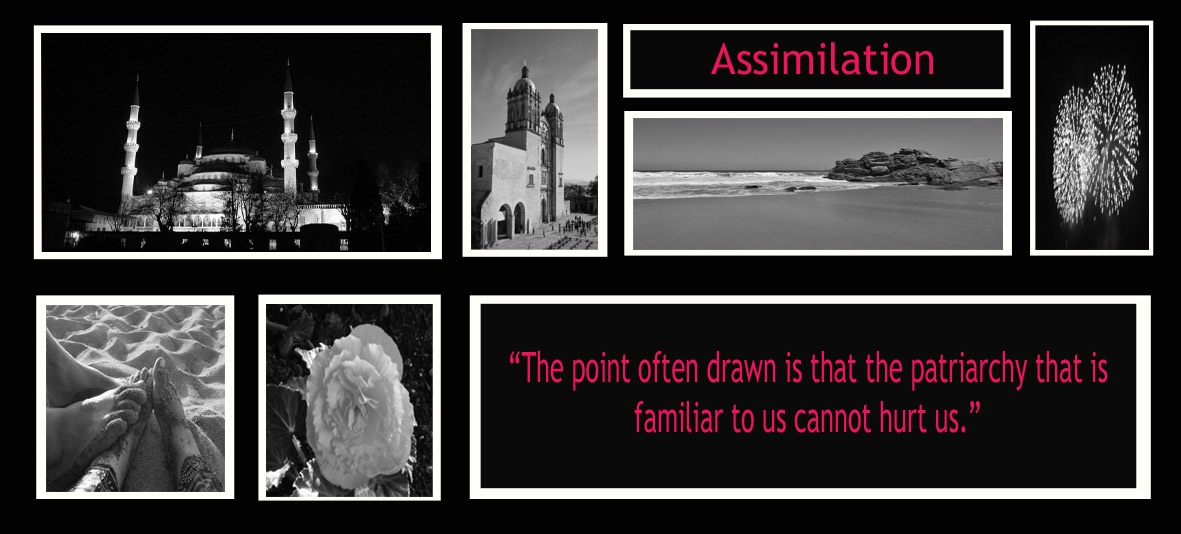A few years ago I wrote a piece on the media coverage of domestic violence issues in Spain and Latin America, and how Islam and the “other’s” culture are depicted as “worse.” The issue continues to be relevant today. A recent article in Reforma, a Mexican newspaper, reports on the incidence of “international romances” between Mexican women and Middle Eastern men. The story results from concerns arising from the Ministry of International Relations (Secretaria de Relaciones Exteriores), which has made a point to create a section on their website warning women about “international romances.” According to the Ministry, international romances commonly result in cyber-fraud, domestic violence and custody battles. Of course the warning is designed assuming not only the danger of Mexican women at the hands of foreign men, but also assuming heterosexual relationships, normative understandings of marriage and pre-conceived notions of inter-faith differences.
Another Mexican newspaper, AM, makes the link between the Ministry’s concerns and Mexican-Middle Eastern relationships. The article shows particular concern over men who practice Islam. Thus, they present the stories of two Mexican women whose partners are Muslims, and who have had “successful” relationships despite the challenges. Something to note is that the piece focuses on cultural difference and on how these women have adapted.
One of the women, Lizbeth, is married to an Egyptian man, and she is quoted as saying:
“At least my husband had never been difficult, here in Mexico. He acts as a Mexican. The only things that he did not like was for me to kiss men when greeting them or having male friends in Facebook. Sometimes he comments on my clothing, but since I never show cleavage or wear shorts, it is ok.”
On the other hand, Carla, the second Mexican living in the UK is in a relationship with an Algerian man. She comments:
“If they [Muslim men] don’t take you seriously, they will let you do what you want. For them, jealousy and possessiveness is a way to show that they want a serious relationship. In their culture that is normal.”
While I am not particularly surprised either by the Ministry’s assumptions about Muslim men or the media’s focus on the women’s justifications for certain behaviours, I do find the whole issue troubling. Being in an inter-racial and inter-cultural relationship myself, I acknowledge the challenges that come along with meeting someone from a different country. However, I always wonder about the assumption of “their” culture being worse than that of “our men.” My own experience has exposed me to a number of comments regarding how Islam and Middle Eastern men are extremely patriarchal.

Those comments are always at odds not only with my own experience, but also with the statistics of domestic abuse, gender-based violence and feminicide in the country. This is not to say that Middle-Eastern men do not come with their own baggage, because many do. However, the idea that “their baggage” is worse than any Mexican man’s baggage is flawed. The point often drawn is that the patriarchy that is familiar to us cannot hurt us as much as the patriarchy that is unknown. The assumption being that we are raised in the system and we will be rewarded by it. Never mind prevalent attitudes of machismo among older and newer generations, anti-LGBTQ behaviours or the constant reminder of the conservative Catholic inheritance that preaches against birth control, abortion and women’s sexual choices. At the end there is a reward for the loyalty of Mexican women to their own patriarchies: we become respectable and eventually gain a place within the patriarchal structure.
Leaving the patriarchy vs. worse patriarchy debate aside, I am troubled by the notion that “success” in inter-faith/inter-racial relationships encompasses women adjusting to someone else’s cultures and desires. Is that what being a successful Mexican woman is? Either complying with our own patriarchy or adjusting to someone else’s ideas of “appropriate female behavior”?
No idea of compromise, no concept of true partnership… Rather, it is about assimilation. And that’s the message being sent. First, we are warned against foreign men; then we are told Muslim men are “worse” than others. Next we are compelled to find a Mexican because it is “better for us,” but if it is not possible, we must assimilate to other men’s “culture” to keep the peace. Is that what being a heterosexual woman in a relationship should be all about?













